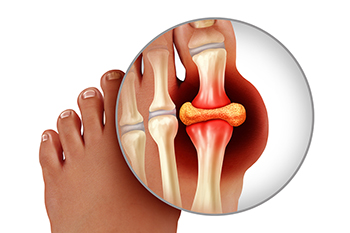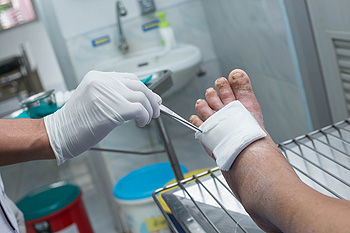September 2021
Tips to Make Sure Your Shoes Fit Right
 Good foot care is key to preventing potential foot problems in the future, and wearing shoes that fit properly is important. There are many things that can be done to assure that your shoes fit properly. Because our feet are at their largest at the end of the day, that is the best time to measure the feet. Many people have one foot that is bigger than the other, and it is important to make sure that the shoe fits the larger foot. Another important thing for shoe fitting is to make sure that there is around half an inch of space between your toes and the edge of the shoes. The ball of the foot should fit comfortably at the widest part of the shoe. Lastly, the heels should fit properly without slipping. If you have questions or concerns about making sure that your shoes fit correctly, please consult with a podiatrist.
Good foot care is key to preventing potential foot problems in the future, and wearing shoes that fit properly is important. There are many things that can be done to assure that your shoes fit properly. Because our feet are at their largest at the end of the day, that is the best time to measure the feet. Many people have one foot that is bigger than the other, and it is important to make sure that the shoe fits the larger foot. Another important thing for shoe fitting is to make sure that there is around half an inch of space between your toes and the edge of the shoes. The ball of the foot should fit comfortably at the widest part of the shoe. Lastly, the heels should fit properly without slipping. If you have questions or concerns about making sure that your shoes fit correctly, please consult with a podiatrist.
Finding a properly-fitting shoe is important in reducing injuries and preventing foot problems. For more information about treatment, contact Genine Befumo, DPM from University Foot and Ankle Center, L.L.C. Our doctor will treat your foot and ankle needs.
Proper Shoe Fitting
A common concern when it comes to foot health, having properly fitted shoes can help prevent injuries to the foot. Out feet affect our posture and gait, which in turn affects the biomechanics and overall bodily structure. With 33 joints, 26 bones, and over 100 ligaments, the potential for serious injury is much greater than one realizes. Although the feet cease growth in adulthood, they still change shape as they mature. Here are some factors to consider when it comes to investing in proper fitting shoes:
- Be sure the shoes fit correctly right away
- Ensure the ball of your foot fits comfortably in the widest portion of the shoes
- Even though they may look fashionable, improper fitting shoes can either create adverse conditions or exacerbate existing ones you may already have
- Walk along a carpeted surface to ensure the shoes comfortably fit during normal activity
Keeping in mind how shoes fit the biomechanics of your body, properly-fitting shoes are vitally important. Fortunately, it is not difficult to acquire footwear that fits correctly. Be sure to wear shoes that support the overall structure of your body. Do your feet a favor and invest in several pairs of well-fitted shoes today.
If you have any questions please feel free to contact our office located in Monroe Township, NJ . We offer the newest diagnostic and treatment technologies for all your foot and ankle needs.
Why Live with Pain and Numbness in Your Feet?
Understanding Gout
Gout is a type of inflammatory arthritis where excess amounts of uric acid causes hard crystals to form in the joints—most commonly affected is the big toe joint. The body’s inability to flush uric acid may be caused by kidney disease, diabetes, high blood pressure, obesity, certain medications, consuming foods and beverages that are high in purines, and a family history of gout. The pain felt by gout can often be acute, and may be accompanied by a burning sensation, swelling, and severe tenderness in the big toe. A podiatrist can diagnose gout through an examination, blood tests and analysis of joint fluid, and create a treatment plan based on their findings and the severity of the condition in the patient.
Gout is a painful condition that can be treated. If you are seeking treatment, contact Genine Befumo, DPM from University Foot and Ankle Center, L.L.C. Our doctor will treat your foot and ankle needs.
What Is Gout?
Gout is a form of arthritis that is characterized by sudden, severe attacks of pain, redness, and tenderness in the joints. The condition usually affects the joint at the base of the big toe. A gout attack can occur at any random time, such as the middle of the night while you are asleep.
Symptoms
- Intense Joint Pain - Usually around the large joint of your big toe, and it most severe within the first four to twelve hours
- Lingering Discomfort - Joint discomfort may last from a few days to a few weeks
- Inflammation and Redness -Affected joints may become swollen, tender, warm and red
- Limited Range of Motion - May experience a decrease in joint mobility
Risk Factors
- Genetics - If family members have gout, you’re more likely to have it
- Medications - Diuretic medications can raise uric acid levels
- Gender/Age - Gout is more common in men until the age of 60. It is believed that estrogen protects women until that point
- Diet - Eating red meat and shellfish increases your risk
- Alcohol - Having more than two alcoholic drinks per day increases your risk
- Obesity - Obese people are at a higher risk for gout
Prior to visiting your podiatrist to receive treatment for gout, there are a few things you should do beforehand. If you have gout you should write down your symptoms--including when they started and how often you experience them, important medical information you may have, and any questions you may have. Writing down these three things will help your podiatrist in assessing your specific situation so that he or she may provide the best route of treatment for you.
If you have any questions, please feel free to contact our office located in Monroe Township, NJ . We offer the newest diagnostic and treatment technologies for all your foot care needs.
Can My Ankle Pain Be Caused by Arthritis?
Arthritis can occur in any joint—including the ankle. When this condition occurs in the ankle, it is typically either post-traumatic arthritis or rheumatoid arthritis. Post-traumatic arthritis can be caused by an old ankle sprain, fracture, or other injury that did not heal properly and has caused degenerative changes. Post-traumatic arthritis can take decades to manifest. Rheumatoid arthritis (RA) is a systemic disease that affects joints throughout the body. In some cases, RA can cause inflammation and alignment problems in your ankles. Through examination, observation, tests, and gait analyses, the source of your ankle pain—whether it is arthritis or some other condition—can be properly diagnosed and treated by a podiatrist.
Ankle pain can be caused by a number of problems and may be potentially serious. If you have ankle pain, consult with Genine Befumo, DPM from University Foot and Ankle Center, L.L.C. Our doctor will assess your condition and provide you with quality foot and ankle treatment.
Ankle pain is any condition that causes pain in the ankle. Due to the fact that the ankle consists of tendons, muscles, bones, and ligaments, ankle pain can come from a number of different conditions.
Causes
The most common causes of ankle pain include:
- Types of arthritis (rheumatoid, osteoarthritis, and gout)
- Ankle sprains
- Broken ankles
- Achilles tendinitis
- Achilles tendon rupture
- Stress fractures
- Bursitis
- Tarsal tunnel syndrome
- Plantar fasciitis
Symptoms
Symptoms of ankle injury vary based upon the condition. Pain may include general pain and discomfort, swelling, aching, redness, bruising, burning or stabbing sensations, and/or loss of sensation.
Diagnosis
Due to the wide variety of potential causes of ankle pain, podiatrists will utilize a number of different methods to properly diagnose ankle pain. This can include asking for personal and family medical histories and of any recent injuries. Further diagnosis may include sensation tests, a physical examination, and potentially x-rays or other imaging tests.
Treatment
Just as the range of causes varies widely, so do treatments. Some more common treatments are rest, ice packs, keeping pressure off the foot, orthotics and braces, medication for inflammation and pain, and surgery.
If you have any questions, please feel free to contact our office located in Monroe Township, NJ . We offer the newest diagnostic and treatment technologies for all your foot care needs.
Being Proactive About Diabetic Ulcers
Foot ulcers are something that every person with diabetes should be vigilant about. Because of poor circulation, neuropathy and other factors precipitated by diabetes, any cut or abrasion on the foot of a diabetic—particularly on the bottom of the foot—has the potential to become a diabetic ulcer. Through daily foot inspections and prompt visits to the podiatrist should the slightest break in skin appear, many wounds may be prevented from developing. If a lesion on the foot is not detected early enough and it progresses into a wound, a podiatrist will try to heal it or manage it to prevent it from worsening. When a diabetic ulcer does not heal, deepens, gets infected, or begins to damage surrounding tissue, advanced care is vital. A podiatrist can help keep the wound sterilized and use advanced techniques such as debridement to remove dead tissue in order to protect healthy tissue and salvage the limb. If you are in need of diabetic foot care, or want to be proactive about diabetic ulcers, schedule an appointment with a podiatrist as soon as possible.
Diabetic foot care is important in preventing foot ailments such as ulcers. If you are suffering from diabetes or have any other concerns about your feet, contact Genine Befumo, DPM from University Foot and Ankle Center, L.L.C. Our doctor can provide the care you need to keep you pain-free and on your feet.
Diabetic Foot Care
Diabetes affects millions of people every year. The condition can damage blood vessels in many parts of the body, especially the feet. Because of this, taking care of your feet is essential if you have diabetes, and having a podiatrist help monitor your foot health is highly recommended.
The Importance of Caring for Your Feet
- Routinely inspect your feet for bruises or sores.
- Wear socks that fit your feet comfortably.
- Wear comfortable shoes that provide adequate support.
Patients with diabetes should have their doctor monitor their blood levels, as blood sugar levels play such a huge role in diabetic care. Monitoring these levels on a regular basis is highly advised.
It is always best to inform your healthcare professional of any concerns you may have regarding your feet, especially for diabetic patients. Early treatment and routine foot examinations are keys to maintaining proper health, especially because severe complications can arise if proper treatment is not applied.
If you have any questions please feel free to contact our office located in Monroe Township, NJ . We offer the newest diagnostic and treatment technologies for all your foot and ankle needs.
Blog Archives
- April 2024
- March 2024
- February 2024
- January 2024
- December 2023
- November 2023
- October 2023
- September 2023
- August 2023
- July 2023
- June 2023
- May 2023
- April 2023
- March 2023
- February 2023
- January 2023
- December 2022
- November 2022
- October 2022
- September 2022
- August 2022
- July 2022
- June 2022
- May 2022
- April 2022
- March 2022
- February 2022
- January 2022
- December 2021
- November 2021
- October 2021
- September 2021
- August 2021
- July 2021
- June 2021
- May 2021
- April 2021
- March 2021
- February 2021
- January 2021
- December 2020
- November 2020
- October 2020
- September 2020
- August 2020
- July 2020
- June 2020
- May 2020
- April 2020
- March 2020
- February 2020
- January 2020
- December 2019
- November 2019
- October 2019
- September 2019
- August 2019
- July 2019
- June 2019
- May 2019
- April 2019
- March 2019
- February 2019
- January 2019
- December 2018
- November 2018
- October 2018
- September 2018
- August 2018
- July 2018
- June 2018
- May 2018
- April 2018
- March 2018
- February 2018
- January 2018
- December 2017
- November 2017
- October 2017
- September 2017
- August 2017
- July 2017
- June 2017
- May 2017
- April 2017
- March 2017
- February 2017
- January 2017
- December 2016
- November 2016
- October 2016
- September 2016
- August 2016
- July 2016
- June 2016
- May 2016
- April 2016
- March 2016
- February 2016
- January 2016
- December 2015
- November 2015
- October 2015
- September 2015
- August 2015
- July 2015
- June 2015
- May 2015
- April 2015
- March 2015
- February 2015
- January 2015
- December 2014
- November 2014
- October 2014
- September 2014
- August 2014
- July 2014








